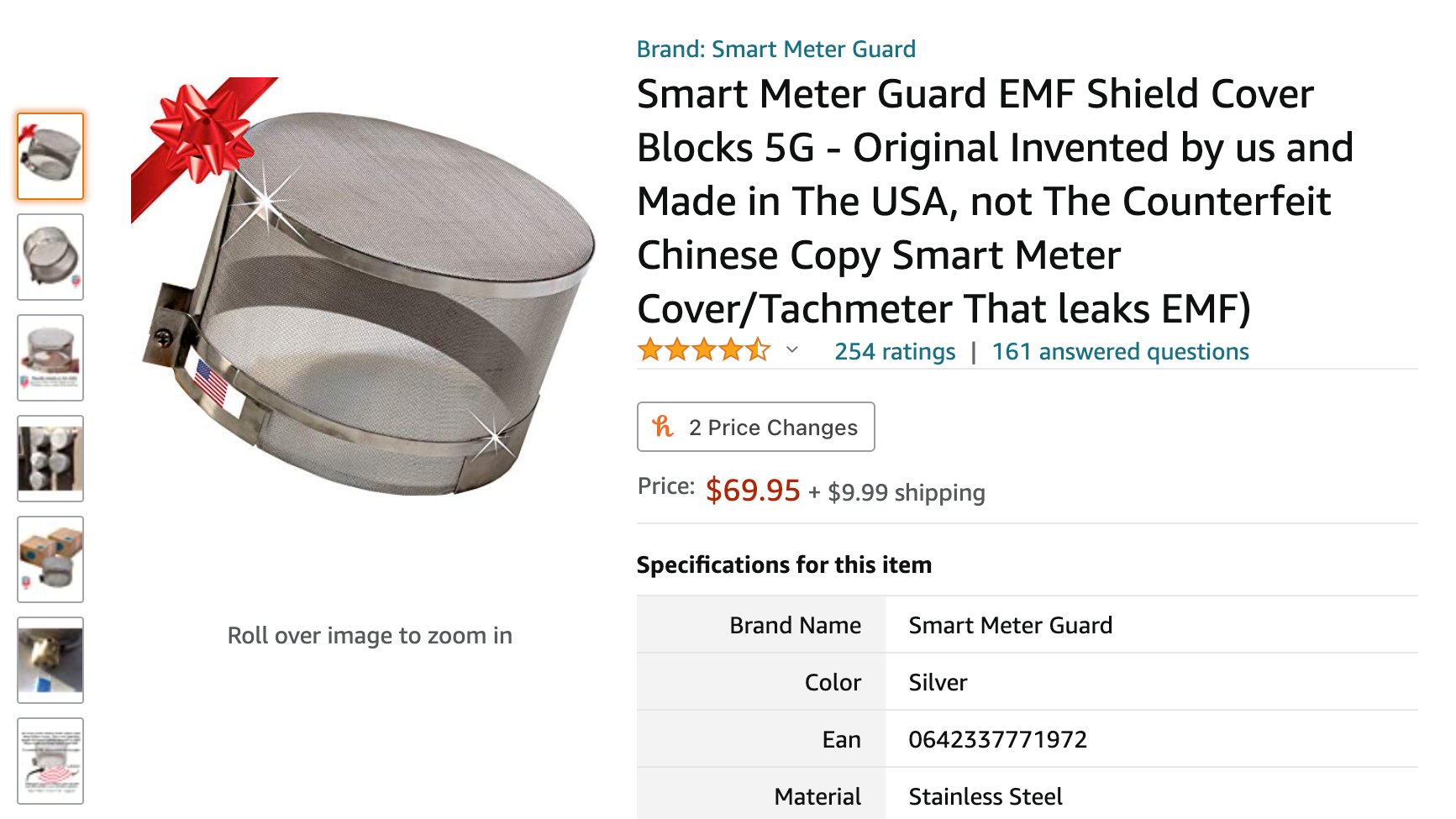While products that promise to protect you from radiation are far from new, now so-called Faraday router cages that claim to block harmful electromagnetic field radiation (and also 5G signal) are proliferating on Amazon.
In a tweet yesterday, user @AnsgarTOdinson posted some screenshots from Amazon of a “Faraday Defence Router Shield // Wi-Fi Guard, Wi-Fi Router Cover, EMF Guard, Superior Shielding Performance, Blocks up to 95% EMF RF Waves, Quality Build, Made in the USA.” Included were screenshots of user reviews, in which buyers were dismayed to find the cage actually borked their Wi-Fisignals.
A cursory search of “Faraday router shields 5G” on Amazon, unfortunately, brings up 159 results. While most claim to block somewhere between 90 to 95% of regular ole EMF radiation, a handful of products also claim that they block 5G while also allowing you to use Wi-Fi. Admittedly, some of these listings are hilarious. Several include photoshopped bows because, you know, ‘tis the season. Others have incredibly specific product titles that clearly tell a story of beef between one scammy brand and another knockoff company trying to crib on their territory. But in all instances, these glorified mesh garbage cans are priced between $70-$200.
If you’re unfamiliar with a Faraday cage, it’s a metal cage that turns electrostatic charges or types of EMF and distributes it through the cage itself, thereby shielding the interior. This same principle is why buildings sometimes mess with Wi-Fi or cell signals. In everyday life, your car, microwave oven, and MRI machines also act as Faraday cages. TL;DR: Faraday cages are meant to help people, not be used as false marketing to cash in on unfounded conspiracy theories.

Some are concerned that 5G could affect your health because of the higher-frequency millimetre-wave signals that comprise part of 5G networks. But there is no evidence that 5G is dangerous to your health. The New York Times has reported that your skin is an adequate barrier against higher-frequency radio waves, including 5G. But even if 5G was dangerous — which, again, there is no evidence for — these products are stupid because cellular 5G does not come from your Wi-Fi router. What’s more, any router shield that lets out any signal is not a proper Faraday cage.
While I’m not a psychic, I’m pretty sure that Michael Faraday, the scientist whom Faraday cages are named after, didn’t intend his invention to be abused in this way. Beleaguered tech reporters and 5G experts the world over are sitting with their heads between their knees, pinching the bridge of their noses.
“Many people seem to think their home router is emitting 4G or 5G,” Sascha Segan, lead mobile analyst at PC Magazine, told Gizmodo. “They are wrong. Home Wi-Fi routers do not generally emit cellular signal. Maybe they’re confused about the naming of 5GHz Wi-Fi? In any case, if people want to put trash cans over their routers to make them useless, um, less power to them.”
“This appears to be a convergence of technical ignorance and conspiracy theories,” said Avi Greengart, president and lead analyst at Techsponential. “5GHz Wi-Fi is not the same as cellular 5G. Putting a router in a Faraday cage — assuming that it’s an effective Faraday cage — stops your router from working properly. It does not protect you from anything, and even if it did, it would be far more effective to turn off bands in the router’s setting, or just unplug it.”
“It’s a box to block your Wi-Fi,” Segan said. “It will work in exact proportion with how much worse it makes your Wi-Fi. There is no magic ‘EMF’ wave for it to block which isn’t the Wi-Fi you’re trying to use. If you’re that worried about wireless signals, get a switch, and use Ethernet.”
“As far as these devices go, they prey on people that are afraid of wireless communications and the radiation that they emit,” Anshel Sag, senior analyst for 5G at Moor Insights & Strategy, told Gizmodo in an email. “I have followed the industry that preys on people’s fear of 5G and most of these products either don’t work at all or they work very well and render wireless communications useless. In either scenario, the consumer is not well-informed about the technology and are being taken advantage of based on their fears. I would not advise anyone to buy any of these devices, ever.”
Gizmodo reached out to Smart Metre Guard, which sells at least three of these devices on Amazon and on their website, about why they chose to market their product this way. We also reached out to Amazon to ask why such fraudulent products were allowed on its site. In each instance, Gizmodo did not get an immediate response.

This is not the first time shady companies have used bogus anti-5G products to profit. One particularly egregious example is the anti-5G USB stick, which claimed to put out a holographic bubble that protected users from the 5G bogeyman. It was, of course, ruthlessly debunked in a tear-down as being nothing more than a $US300 ($403) sticker. Still, these types of scam products abound on Amazon. Not only can you find 5G underpants, you can also find dubious 5G maternity bands to “protect” your unborn child and EMF protection pendants that claim to be programmed with “30+ homeopathic frequencies.”
Ultimately, this is a case of buyer beware. However, Amazon should be ashamed that by allowing these modern-day snake oil salesmen on its platform, it too is directly profiting off of junk science. Admittedly, it’d be a herculean effort to scour the quadrillion listings on Amazon and eliminate every single bogus item. But at the very least, for the sake of an entire industry’s sanity, get rid of the bogus Wi-Fi trash cans. Only then can the spirit of Michael Faraday rest in peace.
We reached out to Amazon for comment. The company said it is looking into the listings.
